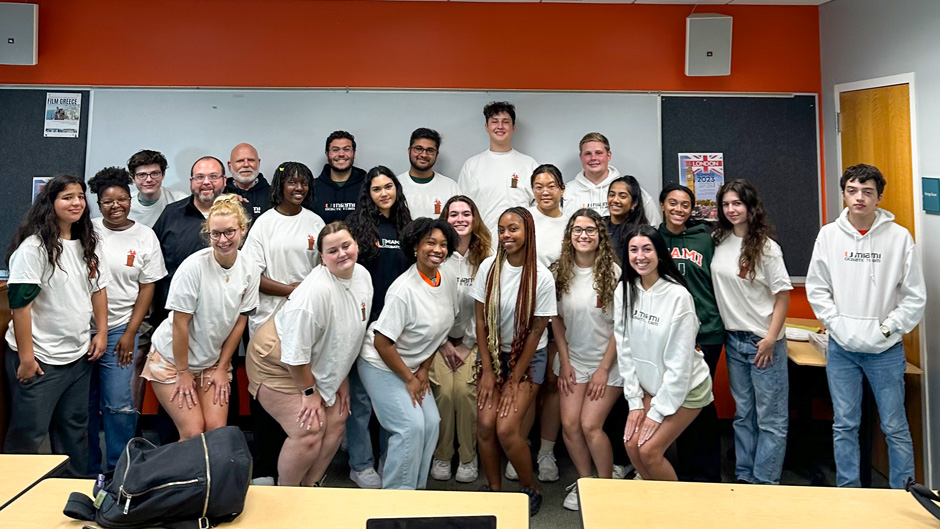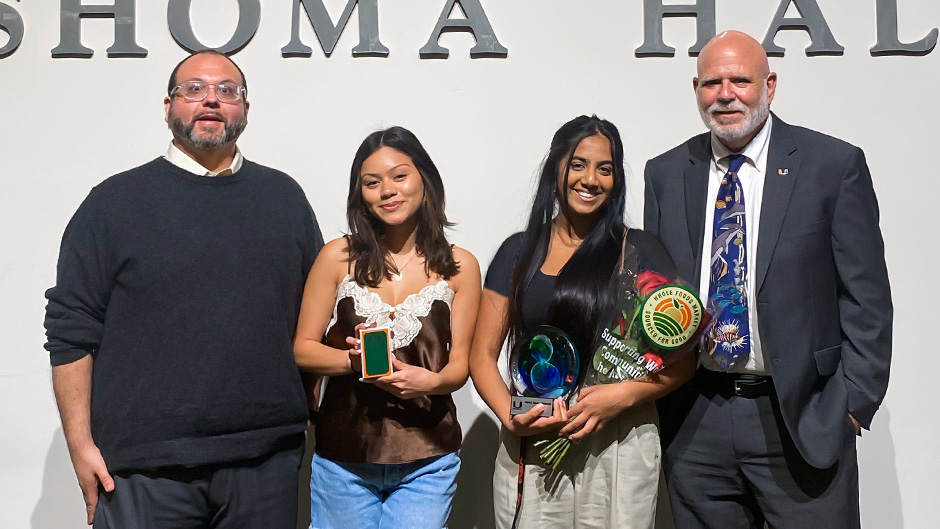Capitalizing on Miami’s unique proximity to the ocean and its vulnerability to the effects of climate change, the University of Miami Debate Team hosted its first Miami Oceans Debates during the weekend of April 22-23 to discuss if “Accelerated Open Ocean Aquaculture Would Be Desirable.”
“We were interested in a topic about the ocean because we live here,” said David Steinberg, associate professor of practice for the School of Communication and director of debate. “We are on the ocean.”
The debate was a civic debate—a format that has been developed in the past 10 years—which deviates from the usual technical style of intercollegiate debate and instead engages in a more conversational discourse, Steinberg pointed out.
There were 34 two-person teams participating from 14 schools and colleges and representing nine states.

Unlike policy and parliamentary types of debate, which involve technical jargon and a timed delivery, the civic one allows for a more persuasive delivery, according to Steinberg. Judges for civic debate are usually stakeholders, experts on the topic being debated instead of the traditional debate coaches. “You engage with the public,” said Steinberg.
That is precisely what senior Iman Sami did. A veteran debater with four years of experience under her belt, she was named the top debater in the meet. Her partner Leah Castañeda, a junior, won seventh place speaker.
“We tried to make it less technical and a little less intense while making everyone educated on the topic,” said Sami, who had to study a topic she knew nothing about.
In delivering her argument for accelerated open ocean aquaculture, she argued that the Earth was undergoing a period of climate change and extreme weather events that challenged traditional forms of ground agriculture. Droughts offered one of the challenges to traditional agriculture.
“Farming that involves cattle has been proven to be harmful to the environment, since cows emit methane and methane is harmful to the environment,” Sami said.
She continued by explaining that expanding aquaculture—which is farming in water—is environmentally responsible since it creates a source of food in healthier habitats and can be used to rebuild stocks of threatened or endangered species.
When her turn to refute the argument came, Sami said that the impact on open ocean aquaculture was unknown since the ocean was so vast.
“It should not be accelerated because we don’t know what its environmental impact will be in the long run,” Sami noted. “There may be long-term effects of doing this in the deep ocean. Instead, we can do this in lakes, ponds, and other smaller bodies of water.”
Steinberg said that one of the most valuable aspects of civic debate is that it allows students to interact with the judges, who are stakeholders in the topic the students are debating.
“They are the people who write the books we are reading,” he said. “These are activists in the field and experts on the topic. Not only does it give us a different viewpoint but it makes us offer a style more translatable in life in a civil society.”
Judges for the Miami Oceans Debates included graduate students Aida Stevenson and Paula Manrique from the Rosenstiel School of Marine, Atmospheric, and Earth Science.
“It’s wonderful to see environmental issues like aquaculture being at the forefront of debates like this,” said Manrique. “Even though this was a new topic for most of the students, they were incredibly well researched and made the debate engaging to watch.”
Other judges included John Stieglitz, assistant professor at the Rosenstiel School; alumni Zac Cosner, resilience programs manager for the City of Miami; Toni Lohroff, education manager for the International Seakeepers Society; Cynthia Toledo of Fairchild Tropical Botanical Garden Science and Education Programs; ocean advocate Karen Beber Futernick; Timothy Kirby, resilience programs manager for the City of Miami; and aquaculturists Shubhan Mathur and Geronimo Leonardi.
Clairmont College from Los Angeles was the tournament winner. Many, like David Romanelli, director of debate for Loyola University, were happy they brought their team to the debate.
“The Civic Debate Conference was an excellent opportunity for my students to test their skills in a way not offered at most events,” said Romanelli.
“Training students to engage with a variety of publics had a demonstrable impact on their communication skills,” he said. “The inclusion of experts in the field as critics forced students to really dig deep on the topic and adapt their approach.”

